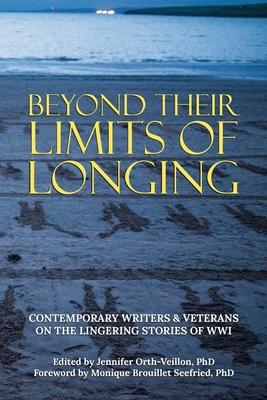In America, WWI became overshadowed by WWII and Vietnam, further diluting the voices of poets, novelists, essayists, and scholars who unknowingly set a precedent for all successive war writers who appear in this collection. Those who survived WWI and wrote about it opened the space for readers and writers alike to explore the complexity both of war's physical and mental horrors and of its historical significance in today's world in crises. From the vast scenes on the battlefield to the fight at the home front, WWI writing and scholarship in this collection allows us, through contemporary perspectives, to inhabit the mind and body of individual soldiers, doctors, nurses, civilians, and families.
Beyond Their Limits of Longing serves as a hybrid thematic collection of personal stories, biographies, scholarly work, fiction, and poetry:
Part 1 "WWI and Veteran Voices of Today," explicitly draws lines connecting experiences as veterans today to the writerly lives and minds of American soldiers from WWI.
Part 2 "Past and Present: Bridging the WWI Military-Civilian Divide" flips perspectives, featuring essays by civilians who discuss WWI as inspiration for their work on American veterans. The scholars and writers in this section suggest that learning about WWI and its soldiers can help bridge the civilian-military divide in today's world.
Part 3 "WWI and Women Too: Fighters, Nurses, Writers," mirrors the Me Too movement that has stirred women from around the world to both stand up and to fortify their fight for physical, emotional, and intellectual equality.
Part 4 "WWI Mattered for Black Lives" reflects the call for a real reckoning with racist and colonial pasts, knocking down statues, rectifying laws, and bringing the overlooked accomplishments of African Americans to light.
Part 5 "Bravery and Resilience: Native Americans in WWI," echoes the actions of American sports teams who have reconsidered their titles deemed offensive by Native Americans.
Part 6 "From the Other Side of No Man's Land" counters the idea that we live in a world made up of increasing protective bubbles. Social media, gated communities, and polarizing politics have made us associate more with people like us despite globalization's promise to bring different parts of the world closer together.
Part 7 "Peace Brokered and the Aftermath" turns to conflicts that have origins in WWI but deepened after the Treaty of Versailles and continued into the modern world: WWII, the Cold War, and the Israeli-Palestinian conflict.
Part 8 "WWI Literature: Critical and Personal Reflections," explores WWI's shocks to the individual and collective conscious that Virginia Woolf captured in writing her essay "The Leaning Tower" in 1940: "Then suddenly, like a chasm in a smooth road, the war came." Just as the unprecedented violence of WWI changed warfare forever, poets and writers of WWI manifested a deep, indelible shift in style, form, and content.
Part 9 "Poetic Responses to WWI," features poems written during the WWI Centennial Commemoration.
Part 10 "WWI in Fiction Today," expresses the demands on writers of contemporary novels that take place in the WWI-era, and features excerpts of works-in-progress.
